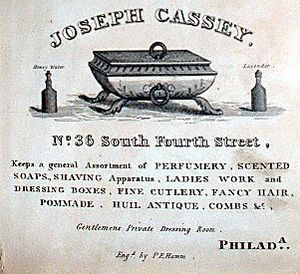Joseph Cassey facts for kids
Quick facts for kids
Joseph Cassey
|
|
|---|---|
| Born | 1789 French West Indies
|
| Died | January 9, 1848 Philadelphia, Pennsylvania, U.S.
|
| Resting place | Saint James the Less Episcopal Churchyard, Philadelphia |
| Occupation | Businessman, real estate investor, activist |
| Spouse(s) | Amy Matilda Williams |
| Children | 8, including Peter William Cassey |
| Relatives | Peter Williams Jr. (father in-law) |
Joseph Cassey (1789–1848) was an important American businessman and activist. He was born in the French West Indies. Joseph Cassey worked as a barber, wig maker, and perfumer. He also invested in real estate. He lived in the famous Cassey House in Society Hill, Philadelphia. He was a leader in the African American community there.
Contents
Early Life and Family
Joseph Cassey was born in 1789 in the French West Indies. This area is now part of the Caribbean region. He moved to Philadelphia before 1808. He joined the African Episcopal Church of St. Thomas.
In 1825, Cassey married Amy Matilda Williams. She was from New York City. They had eight children together. His father-in-law was Peter Williams Jr.. He was an African-American priest and abolitionist. An abolitionist was someone who worked to end slavery.
A Successful Businessman
Joseph Cassey owned many buildings in Philadelphia. He rented them out to people. By 1840, he was very wealthy. Most of his money came from his real estate business.
Cassey worked with Robert Purvis in the real estate business. They owned a farm together in Bucks County, Pennsylvania. Many important people visited this farm. These visitors included people who fought for women's rights and to end slavery. One famous visitor was Lucretia Mott.
Cassey was one of the richest Black Philadelphians in the 1800s. Other wealthy Black leaders included Frederick Douglass and James Forten.
Fighting for Freedom and Education
Joseph Cassey was a strong activist. He worked to help African Americans.
- Helping People Move to Haiti: In the 1820s and 1830s, Cassey was the Treasurer for the Haytien Emigration Society. This group helped free African Americans move to Haiti.
- Supporting Schools: In 1818, he helped lead the Pennsylvania Augustine Society. This group supported schools for African American children.
- Working for Education: In 1831, Cassey attended a special meeting in Philadelphia. It was called the First Annual Convention of the People of Color. This meeting focused on improving education for African Americans. After this, Cassey worked even harder for education.
- Starting a College: In the early 1830s, Joseph Cassey and other abolitionists tried to start a college. It was called the "College for Colored Youth" in New Haven, Connecticut. This college would teach practical skills. However, people in New Haven did not want the college there.
Spreading the Word Against Slavery
Cassey was an early supporter of The Liberator. This was an important newspaper that fought against slavery. It was published by William Lloyd Garrison. Cassey helped pay for the newspaper and shared it in Philadelphia. He worked with others like James Forten to promote it.
In 1833, Cassey became the Vice President of the Massachusetts Anti-Slavery Society. This group was part of the larger American Anti-Slavery Society. He helped fund these groups. From 1834 to 1836, he was on the Board of the American Anti-Slavery Society. He also served as Treasurer for the American Moral Reform Society from 1835 to 1841.
In 1839, Cassey, Forten, and Stephen Smith created a scholarship. This scholarship helped African American students who did not have much money. It allowed them to attend the Oneida Institute in upstate New York. This school accepted students of all races.
Community Involvement
In 1841, the Gilbert Lyceum was started. This was the first science and literature club created by African Americans. The Cassey family was involved, along with other important people like Jacob C. White Jr., John C. Bowers, and Sarah Mapps Douglass. Many of these people also helped start the Philadelphia Female Anti-Slavery Society in 1833.
Joseph Cassey passed away on January 9, 1848. He is buried in the Saint James the Less Episcopal Churchyard in Philadelphia.
See also
 | Bayard Rustin |
 | Jeannette Carter |
 | Jeremiah A. Brown |


